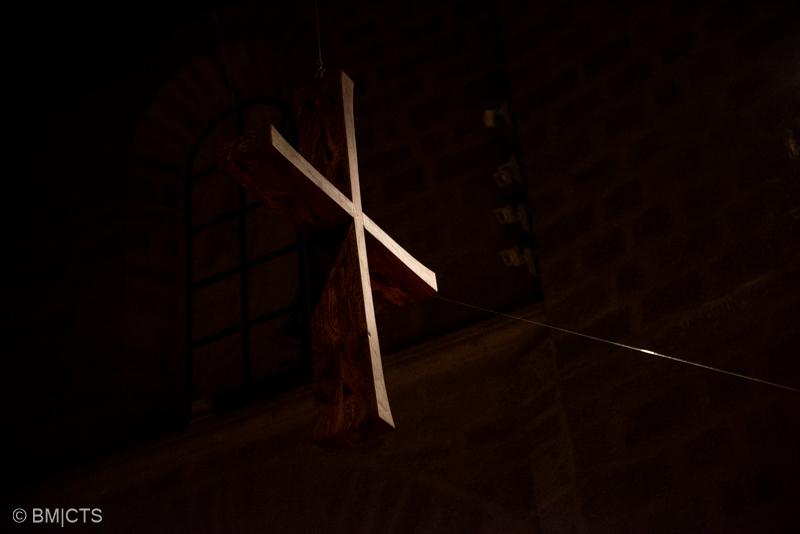Tuesday 17 October was the day we asked God for peace in the Holy Land and for all the people who live there. Proposed by the Assembly of Catholic Ordinaries of the Holy Land, a “Day of prayer and fasting for peace” was celebrated in the Holy Land. The whole of the Catholic Church followed this initiative, invited by the Pope to spiritually join their brothers in the Holy Land.
In prayer with the Franciscans
Various moments of prayer, which had as their central point the Adoration of the Eucharist and the recital of the Rosary, as suggested in the guidelines prepared for this occasion, were held in the sanctuaries in the care of the Franciscans of the Custody of the Holy Land. In St Saviour’s church in Jerusalem, moments of community and personal prayers alternated in front of the Most Holy Sacrament, exposed from 12.30 p.m. At 6.30 p.m., the Custos of the Holy Land, fr. Francesco Patton, presided over a moment of meditation and the prayer of the Vespers, with which the Adoration came to an end. “With my heart full of shock for the horrors of the hatred, violence and war which are wounding this Holy Land,” said the Custos as he introduced the prayer, “we are raising our supplication to God, King of Peace, so that Israelis and Palestinians can find the path to dialogue.”
At the Holy Sepulchre, the celebrations were held according to the rules of the Status Quo, with a particular intention to ask for peace. The same happened in the Basilica of the Nativity in Bethlehem, where a community moment of prayer was also held – Rosary and Mass – in St Catherine’s church. There was a full programme in Nazareth: in the Basilica of the Annunciation, a morning Mass started the day, during which the Most Holy Sacrament remained exposed for the whole time. The Rosary, the Crown of Mercy was recited and the Patriarchal Vicar for Israel, Mons. Rafic Nahra, presided over a Solemn Mass in the evening. The day was brought to an end with the Rosary of St Joseph.
Prayer lights up the way
Prayer is the “Christian answer to what we see,” said Cardinal Pierbattista Pizzaballa, Patriarch of Jerusalem of the Latins, opening the moment of prayer in the church of the Latin Patriarchate. “Prayer does not produce results, but generates true life. It does not spare us our work, but lights it up. It does not spare us the road, but it points it out to us. We are here to cry out to God and ask him to light up our work, and point out the way to us and give us the strength to live in this situation as Christians, and even before that, as human beings.” Some representatives of the other Christian Churches also took part in the prayer, as well as a large number of faithful.
A community prayer
Different groups and communities gathered together to pray. In the Convent of the Capuchins, in Jerusalem, the small community, mainly Italian speakers, which every Sunday attends Mass, joined the friars. In the church of the Hebrew-speaking community, the adoration of the Eucharist was held, animated by the youngsters of the parish, and the Mass with the parish priest Benedetto Di Bitonto.
Praying for the persecutors
In the Basilica of the Dormition, on Mount Zion, the Benedictine monks organized a “marathon” of prayer called “the Church under the cross”: from midnight of 17 October for 24 hours, the church stayed open for prayer. After the Mass at 7.30 in the morning, the continuous reading of the 150 psalms of the Bible started, which reached its climax at midday with the singing of the great psalm 119. In the evening, there was another emotional moment with the young students of the TheologischesStudienjahrJerusalem who organized a prayer in the style of Taizè. “We believe that each human being is created in the image of God,” the abbot, Father Nikodemus Schnabel, whom we interviewed, said. “Even a murderer, even a person who has committed terrible sins, is still a human being, a person created in the image of God. We all pray for the victims, but we also have to pray for the guilty parties! Let us pray for those who have committed indescribable crimes, who have killed, so that they may realize what they have done, repenet and ask God for forgiveness and find the mercy of God.”
On the side of peace
As the day of peace was drawing to an end, the news arrived of the devastation of the Anglican hospital of al-Ahli di Gaza, which created turmoil in the whole of the Arab world. On the morning of Wednesday 18 October, at the end of the General Audience, Pope Francis appealed once again for peace, to avoid a humanitarian catastrophe and the extension of the conflict, and for weapons to be put down. “War does not solve any problem. It only sows death and destruction. War wipes out the future. I exhort believers to take only one side in this conflict: the side of peace. Not in words, but with prayer, with total dedication.” The Pope has called for a new day of fasting, prayer and penitence on 27 October.
By:Marinella Bandini






